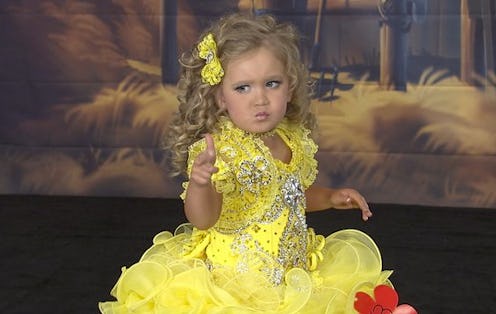News
France Bans Beauty Pageants for Kids

In a somewhat interesting move, the French Senate voted yesterday to ban beauty pageants for girls under the age of 16. According to the New York Times, pageants in France are not all that popular and tend to occur mostly in rural areas. The Times also notes that the glitzy pastime is “far less intense than in the United States.”
Apparently, the US version of big-hair, big-glitz pageants is exactly what the French Senate is trying to avoid. Maybe they saw one too many episodes of Here Comes Honey Boo Boo , or maybe someone’s daughter didn’t win that Ultimate Fancy Grand Supreme title. Either way, pageants are out — anyone who “helps, encourages, or tolerates” the participation of young girls in pageants can be fined up to $44,000 and spend up to two years in jail.
All of these penalties seem pretty heavy (and hypocritical) when you consider the use of underage models in France’s highly important fashion industry. There are some laws that protect child labor in the fashion industry, but most only address working hours. At Fashionista, writer Tyler McCall wondered if the modeling industry would be the next target of these laws that attempt to curb the sexualization of children.
France’s Minister of Women’s Rights Najat Vallaud-Belkacem opposes the new law because the penalties are too harsh. She attempted to have the law mitigated by allowing pageant producers to seek permission to host their events, but no such luck. Other opponents of the ban objected to the idea that pageants were sexualizing children, saying that they existed to improve the self esteem of young girls, and allow them to feel like "princesses for a day."
What’s clear is that the sexualization of young girls is a real problem, and there’s no doubt that the pageant, fashion, and beauty industries all have some culpability. The standard critique of beauty pageants — that they show young girls that beauty should be valued above all else — has some real merit, but ultimately pageantry isn’t the problem. Sexualization of children, particularly young girls, is a much broader problem than spray-tanned seven year olds.
Young girls are surrounded by sex. Companies spend billions of dollars to advertise sexualized toys to them, record labels market latently (and overtly) sexual music to them, and clothing manufacturers sell them thongs and padded bras. The sexualization of children has as much to do with supply and demand as it does with schoolgirl-style Britney Spears videos or beauty pageants. Companies have been selling sex to kids for years, and that’s unlikely to stop soon.
Banning pageants does nothing to address the underlying causes of the sexualization of young girls, which has surprisingly been a goal of the French government since early last year. A spread in Paris Vogue, featuring a very adult-looking 10 year old Thylane Loubry Blondeau posed provocatively, outraged French citizens and inspired a report by the country’s Health Minister on this very issue.
This report recommended “Mini-Miss” pageants, provocative pre-teen clothing, and children’s lingerie be banned, but only one of those recommendations actually became law. Instead of addressing the root issue of sexualization — the commodification of young girls’ sexuality — the French Senate took the easy way out.
Standing up to the fashion industry in France may be about as feasible as standing up to Wall Street or Big Oil in the U.S. But, if the French government is really serious about a "new fight for equality", as the title of the Health Minister’s report would suggest, asking the companies that produce the sexy lingerie for little girls to stop turning them into sex objects is the only way.